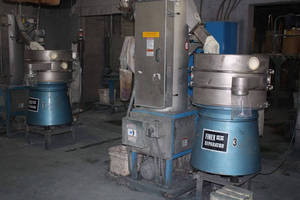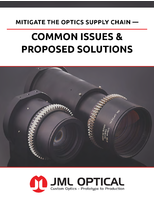Improved Separating Technology Boosts Productivity up to 50% at Chicago-Area Plant

Switch to modern screening ensures quality, minimizes reprocessing, and improves operator productivity at Accurate Color & Compounding
For processing industries, the process is everything. While current processes may be sufficient to keep the doors open today, they often can hinder taking business to the next level tomorrow. Zeroing in on one key element can sometimes be enough to put productivity into overdrive.
One manufacturer of custom color concentrate and additives, for instance, found that it could reach new levels of productivity and growth by turning to advanced separating equipment of innovative design.
"The new separators give us up to 33% more production up time than our previous system with more accurate screening and better yield," says Jason Yelm, Plant Manager of Accurate Color & Compounding (ACC), a Chicago-area company that provides colorant and additive solutions for manufacturers' processing needs.
"We've eliminated unnecessary re-processing, and spend less time processing each customer batch one each extruder," adds Yelm. "By essentially automating quality control and enabling operators to multi-task,we've boosted their productivity by up to 50%."
A need for more productivity
As a specialist in precision color matching, ACC prides itself in producing custom color concentrate and additives to customer specification, and has the capability of matching, sampling, producing and delivering colorant in the same day when necessary.
However, recent growth had company leaders realizing that productivity would need a boost, particularly in quality assurance, to grow business to the next level.
Production started with extruders, which pushed out plastic that got cut to size in an underwater pelletizer.The result was cooled with water, put through a drying system, and shipped. Previously, for quality control the process relied on operator inspection and the use of hand screeners on the production lines.
"It was a challenge to efficiently separate material to custom specifications, including precise densities and different pellet shapes," says Yelm. "The inspection process was labor intensive and if any product was borderline, the entire batch was re-processed. For the most efficient material processing, adjustable separation equipment which enabled separation quality of the pellets to be optimized was necessary."
Another productivity bottleneck was stoppage in the dryer caused by oversize, which required recurrent diehead changes, causing downtime and slowed production.
Assuring quality and productivity
ACC sought more efficient material separation to assure quality and raise productivity. As a final quality check before drying, Yelm trialed on-site at no cost a 40" separator by Russell Finex a manufacturer of Separators, Screeners and Filters.Pleased with the results, he bought the Separator as well as six more he's added to production lines in the last year.
"Compared to traditional spring-type Separators, I like the capacity, throughput, and adjustable weight system of the Russell Finex Separator," says Yelm. "After the trial, it was clear the machine was right for the job."
Traditional designs incorporate a spring-mounted separator and a custom motor with a pair of eccentric weights at the end of the motor shaft. However, this design lacks accuracy in controlling the force of vibration,which can be imparted to the mesh, and is typically limited to a speed of 1200 rpm.
In contrast, the separators from Russell Finex omit the need for springs which are replaced by a unique rubber suspension system and use an innovative arrangement that employs a separate vibrator assembly. This allows much higher forces to be put into the machine and focuses the majority of the energy on the screen itself. The infinitely adjustable weight system of the vibrator assembly creates a more finely-tuned and vigorous action, significantly raising sieving efficiency and running as standard at 1800 rpm.
"The separator vibrates quite a bit faster than typical machines, which helps with throughput," says Yelm. "Its adjustable weight system lets us screen material at the rate, density, and pellet shape needed," he adds, noting that changing the setting of the out of balance weights changes how the material spirals on the screen to maximize screen usage. "This allows us to efficiently work with a variety of different materials, which is key since everything we do is custom. We're optimizing quality, throughput, and yield."
Yelm also appreciates how the separator's vibratory housing is designed to use a high mass machined casting, coupled to a standard electric motor. With its out-of-balance weights fitted, the high mass casting operates like a giant flywheel, transmitting power into the screening area more effectively than similar separators fitted with vibratory motors.
"The out of balance weight system has improved our set up and throughput," says Yelm. "Since each point on the weight system has marks, we've kept track of what position works best for what material. Now it's easy to optimize separation accuracy and material flow for different materials, and to ensure a quality process with different pellet sizes."
The switch to modern screening at ACC has not only helped to ensure quality and minimize reprocessing, but also improved operator productivity up to 50%.
"Because the separators reliably ensure the quality of our pellets in an automated way, it's freed our operators from a focus on inspection and allowed them to multi-task," says Yelm. "They can watch another line, do set up, material handling, or housekeeping, in addition to periodic spot checks. Altogether, they've become up to 50% more productive."
The new separators have boosted production uptime as well, according to Yelm. "They've eliminated stoppages in our dryer caused by oversize and reduced the need to change die heads by 30 to 40%, minimizing downtime," he says. "By setting up specific mesh sizes for customers, we provide the exact pellet size they want with every production run; and we let runs go longer since we reliably filter out any undesirable sized pellets."
The design of these separators can go one step further in increasing throughput by utilizing a Vibrasonic deblinding system in conjunction with the screen. By energizing the wires of the screen mesh with an ultrasonic vibration, the friction between the product and the screen is effectively reduced. In the case of the Russell Finex machines, mesh "blinding" can be reduced down to 20µ, helping to move material through the screens faster.
Though mesh deblinding down to 20µ isn't currently needed by ACC, Yelm says the capability would be helpful if the company did specialized work at a smaller size.
"In the last year, we've assured quality while improving productivity and labor efficiency," says Yelm."ACC has grown through the down economy and continues to grow, and the Russell Finex Separator is one of the factors that's helped us achieve this."
Russell Finex has over 75 years of experience manufacturing and supplying separators, screeners and filters to enhance productivity and ensure product quality.The company serves a variety of industries in over 100 countries with applications that include adhesives, ceramics, chemicals, colors,enamels, explosives, food, inks, latex, metal powders, paint, paper coatings, pharmaceuticals, plastisols, powder coating, and waste oils.




